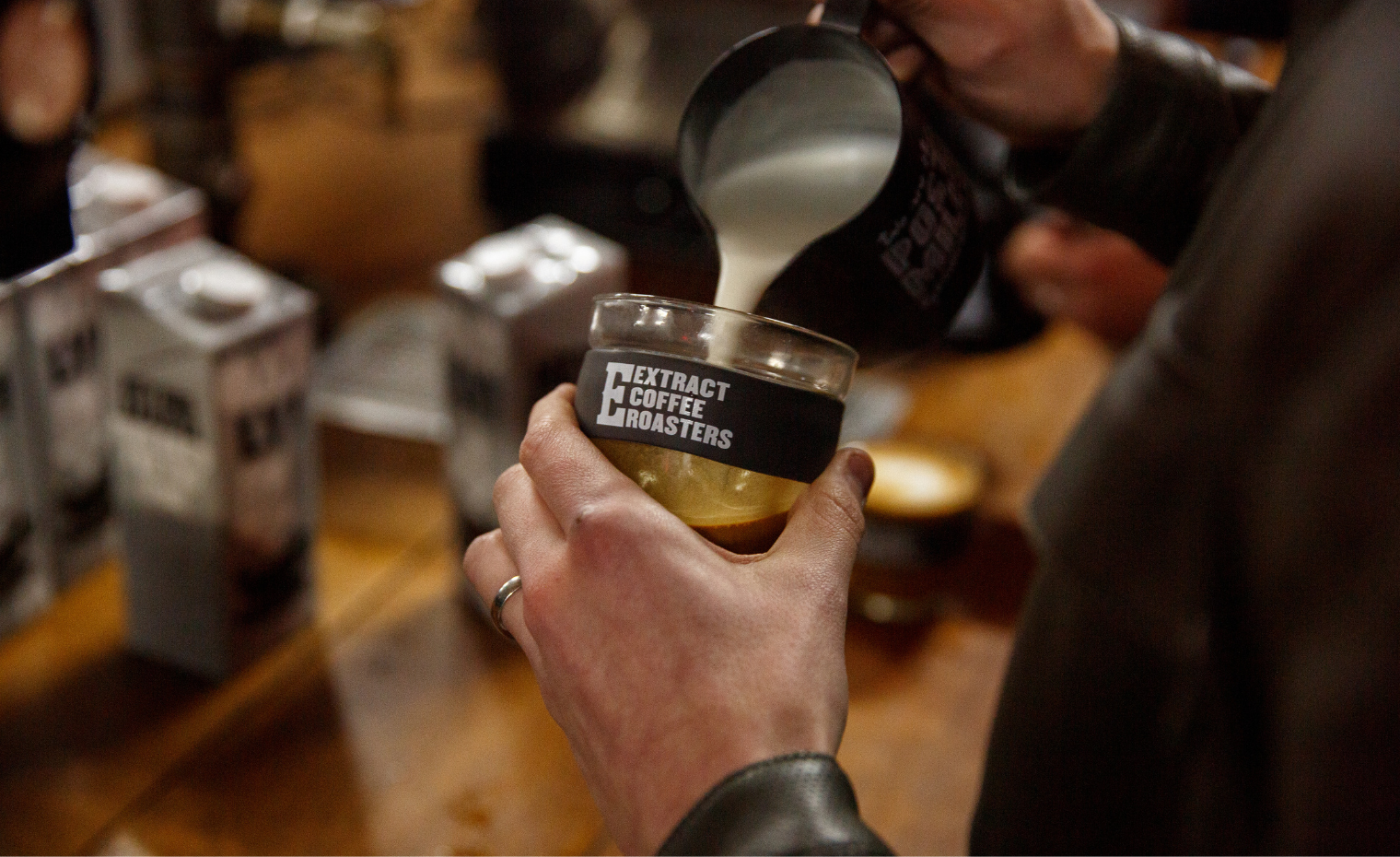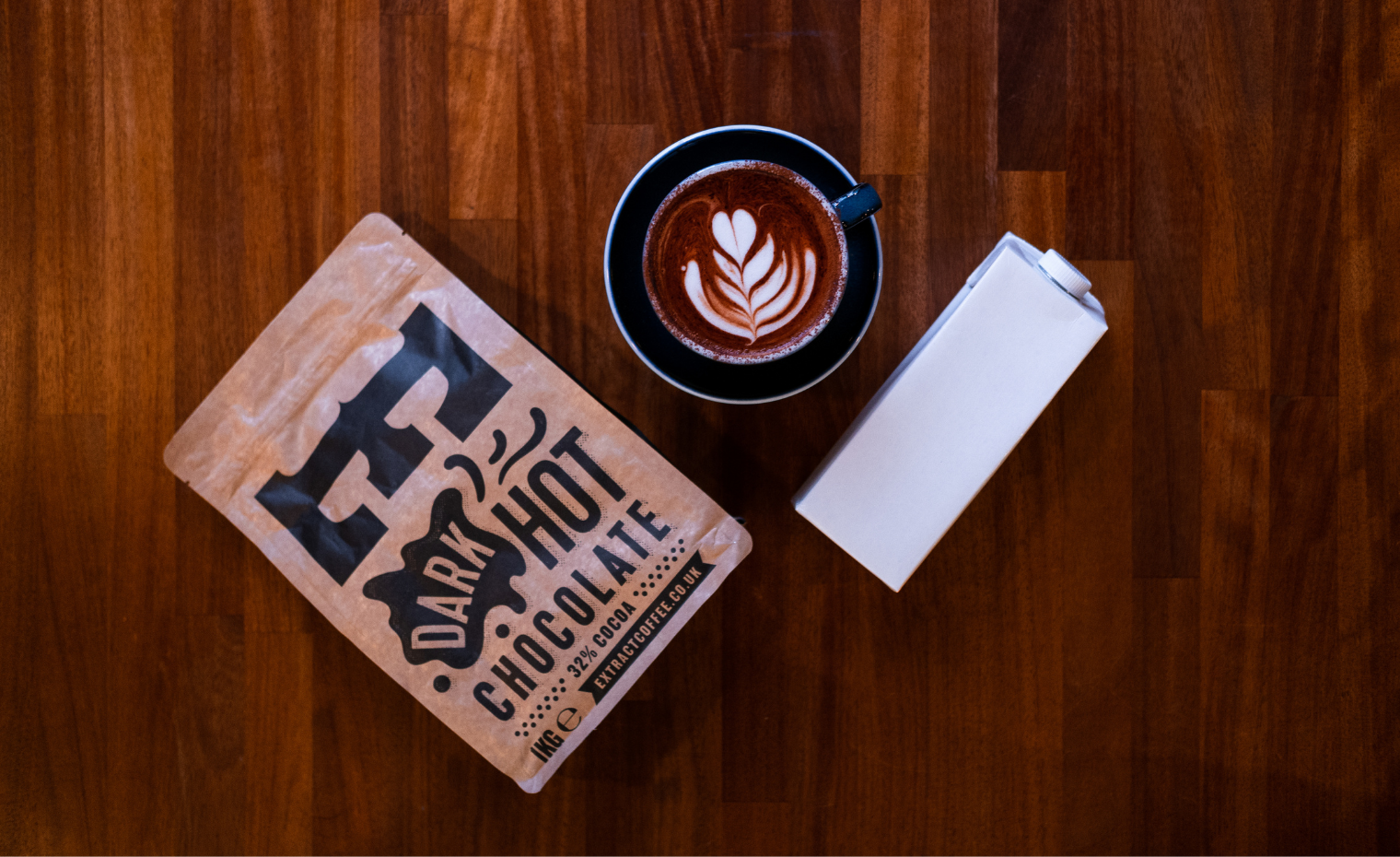
How to get the best out of alternative milks in coffee
As we write this, it’s Veganuary and many coffee drinkers are ditching the dairy.
At Extract, we’re big advocates of filter coffees which taste great as black coffee with no milk at all and we would definitely recommend trying a lighter roast, filter coffee this veganuary. If black coffee just isn't your thing and you’re looking to make the most of dairy-free alternative milks and are looking for the best coffees for alt milks to make an epic vegan flat white, keep reading.

Top tips to get the most out of your coffee when drinking it with alternative milks
- If you like a longer, milkier coffee drink, like a latte or cappuccino, then head for a lower acidity coffees like Cast Iron, Organic or Rocket which have a medium to dark roast profile. The darker roast on these coffees mean they’ll be able to balance the sweetness of your alt milk.
- If you prefer shorter drinks, like a piccolo or macchiato, higher acidity coffees work best, check out our Single Origin coffees for our latest limited-edition roasts. Using just a dash of oat milk will mean the more delicate flavours of the coffee won’t be overpowered or lost and will taste balanced.
- If you're looking for something in the middle, Extract Original makes a mean oat milk flat white. Espresso style brew methods work particularly well with oat milk. This is because they produce a strong, dark coffee which can be well balanced with alternative milk. Alternatively, coffee brewed in a moka pot, or a strongly brewed cafetiere can stand up to the creaminess of the oat milk and will make a delicious tasting coffee.
- If brewing an espresso, which is highly acidic and concentrated, it’s important to use the barista editions of the alternative milks. These contain more protein and acidity regulators (nothing to worry about, usually just a bit of calcium carbonate or chalk) which balance the flavours and textures. Try looking in your local health food store or online retailers if you can’t find barista editions in supermarkets.
What are the best plant based milks to use with coffee?
There are so many different plant-based milks available. But which ones work best with coffee? Does it even make a difference which one you use? Below we've summarised the pros and cons of some of the most popular alternative milks when it comes to adding them to coffee.
OAT MILK
What is oat milk?
To make oat milk, oats are soaked in warm water, ground to a pulp and treated with enzymes to extract nutrients from the oats. The remaining oats are then separated leaving behind the liquid: oat milk.
Is oat milk any good in coffee?
What we rate about oat milk with coffee.
- Oat milk steams well without splitting, so you can still pour decent latte art.
- Its creamy texture means oat is the closest tasting alt milk to dairy.
- Oat milk production has a lower environmental impact than dairy and most other alternative milks. No methane (unlike dairy), only small amounts of CO2, and far less water than dairy or almond milk production arguably make it the more sustainable option.
The drawbacks of oat milk in coffee
- Oat milk is not always gluten free, so coeliacs may need to find a different alternative milk.
- Oat milk’s creamy, sweet oatmeal flavour can overpower a lighter roasted coffee if you use too much. So you need to pick your coffee and style of drink wisely!
- Fewer nutrients mean oat milk needs to be fortified with calcium, iron and vitamin A to be a nutritional substitute for dairy.
- Whilst oat milk steams better than any other alternative milk, the lower protein content mean it’s harder to get the perfect latte art pour compared to dairy milkAdding a little dash of un-steamed oat in your shot and swirl around before pouring your hot steamed milk helps it stabilise it without splitting. You'll get better definition in your latte art.
ALMOND MILK
What is almond milk?
Almond milk is made from blended almonds. The nuts are soaked, then blended and strained, leaving behind almond milk.
Is almond milk any good in coffee?
What we like about drinking almond milk in coffee.
- For drinks which don’t require steamed milk or latte art (like an Americano or a cafetiere), almond milk is a tasty dairy-free option.
- We like almond milk best with lower acidity coffees like Extract Original, or you can embrace the nutty flavours with something like Dr. Strangelove.
- Whilst almond milk has the highest water footprint of any alternative milk, it’s greenhouse gases are actually the lowest.
- Low in fat but a great source of calcium.
Some of the drawbacks of almond milk with coffee.
- Almond milk’s low fat and protein content makes it very tricky to steam. The result is very bubbly milk rather than the silky texture you want for latte art.
- High acidity coffees, such as some of the single origin coffees we roast, or natural process coffees don’t balance very well with almond milk. Stick to something with less acidity.
- It’s widely reported that the production of almond milk is bad for the bees, with devastating impacts on the bee population.
- Almond milk is also really water intensive to produce with a water footprint of 74 litres per 200g, second only to dairy. A member of our roastery team made almond milk in a previous job and tells us the almonds would be washed and strained ten times to produce just two pints. If your reasons for switching to alternative milk are environmental, there are more sustainable alternatives.
SOY MILK
What is soy milk?
Soy milk is a plant-based alternative to dairy; it is made by soaking and grinding soy beans and may be made at home or bought commercially.
Is soy milk any good in coffee?
What we like about soy milk:
- The taste of soy milk is pretty neutral, which means it can work with many coffees without impacting flavour balance. We like a soy milk flat white made with Rocket.
- Soy milk’s saturated fat content is very low, especially compared to dairy
- We find soy milk steams quite well and doesn't split as much as some of the other alternative milks, it still might be a challenge to create beautiful latte art though!
But there are some drawbacks:
- Soy is a common allergen for both adults and children, so it’s always good to check if you’re serving coffee to someone else
- The majority of soy is produced in the United States, meaning it often comes from genetically modified plants, which can be a concern for some people.
- Soy has been linked to deforestation in the Amazon, however many soy milk manufacturers and producers sustainably farm so it’s important to check your source is sustainable.
- Soy also has a relatively high concentration of certain hormones which are similar to human hormones, which can worry some people, though it is not confirmed this will impact health negatively.
SPELT MILK
What is spelt milk?
Spelt milk is made by soaking spelt grains, also known as dinkel or hulled wheat, in water for twelve hours, sieving the grains, and then puréeing them with water and straining them. It’s a relatively unknown plant milk, but a great alternative to dairy.
Is spelt milk any good in coffee?
What we like about spelt milk:
- Spelt is commonly grown in the UK, meaning the food miles on spelt milks can be significantly lower than alternatives.
- Spelt has a subtle nutty flavour, so we find it really complements the Original flavours of caramel, cocoa and hazelnut.
- Many spelt milk manufacturers, such as our friends at Sharpham Park, use organic farming methods, and the flavours or spelt milk also work perfectly with the chocolatey flavours of our Organic Espresso.
The drawbacks:
- Spelt is a form of wheat, meaning spelt milk is not suitable for people with wheat intolerances or allergies.
- Spelt is relatively new to the alternative milk game, meaning it’s not commonly found in stores or cafes. However, it is on the rise and definitely worth a try.
COCONUT MILK
What is coconut milk?
Coconut milk is made by grafting the white flesh of mature coconuts, blending with water and straining to create the right consistency. Coconut milk can be easily confused with coconut water, which is found naturally in unripe green coconuts.
Is coconut milk any good in coffee?
What we like about coconut milk:
- Coconut milk tends to be slightly thicker and creamier in consistency than other alt milks, meaning your coffee can be velvety in texture.
- Though it’s not coffee, we love coconut milk in a hot chocolate. Gently heating the milk so it doesn’t split and combining with our Extract Dark Hot Chocolate powder gives us all the Bounty vibes and a real treat. Plus, it’s completely vegan.
The drawbacks:
- Coconut milk does have a strong taste, meaning it can overpower delicate flavours of coffee, even those roasted darker. It’s definitely only one to embrace if you love the taste of coconut!
- In our experiments, coconut milk does not steam very well. The result is large, inconsistent bubbles which don’t give a great mouthfeel.
- Coconut milk is very high in saturated fat, making it quite an indulgent option.
- Look carefully at the sourcing of your coconut milk. Sustainable farming can be hard to trace, and some coconut farms have been found to be paying unethically low wages to workers.

Though this is not an exhaustive list of plant based milks, we’re still experimenting with potato milk, hemp milk and pea milks with coffee, we hope this helps you make the most of dairy free coffee.
We have new coffees coming out all the time so we encourage you to experiment yourself. If you're looking for coffees which work really well with alternative milks, check out our alt milk suggestions here.
